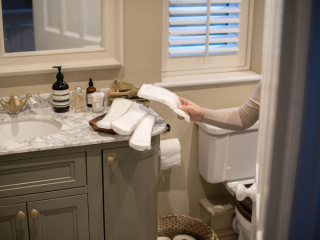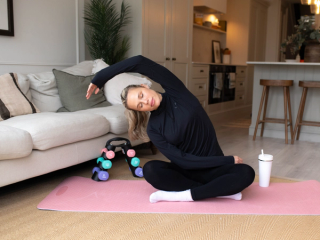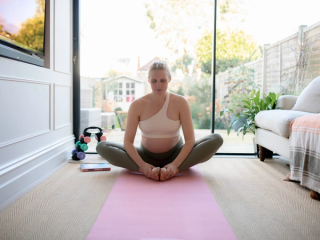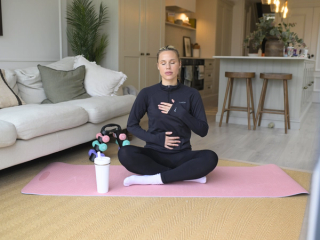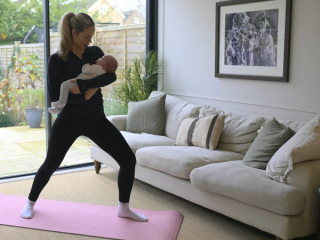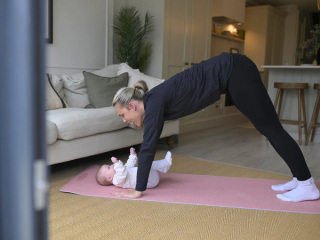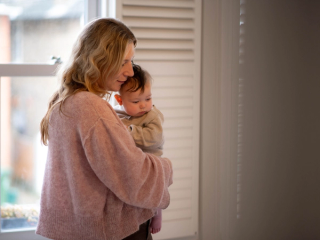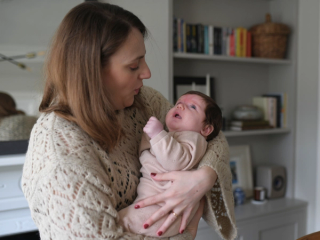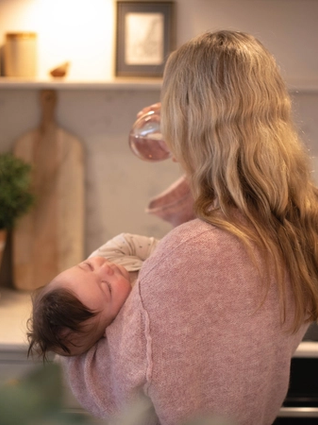
- Home
- Advice Hub
- Newborn
- Postnatal Care
- Postpartum Recovery
Postpartum recovery
Healing from the effects of both pregnancy and birth takes time, but you can support healing with simple daily habits in the early weeks. Read Aby's article to discover a Pelvic Health Specialists top tips for postpartum recovery.
I think it’s fair to say having a newborn doesn’t make the ideal circumstances for postpartum recovery: sleep deprivation, grabbing one-handed snacks, whilst processing this huge life change. It is common for attention to be fully focused on your baby, but you are still very important and need looking after, too. Of course, healing from the effects of both pregnancy and birth takes time, but you can support healing with simple daily habits in the early weeks.
Here are my top tips:
Get the bladder back on track!
When you’re pregnant, your bladder is squished by an expanding uterus, meaning you will need to wee a lot. We want to train our brain-to-bladder pathways to know what a full bladder feels like again.
- Avoid just-in-case wees
- Don’t go just because you are up in the night with the baby.
- No power peeing because you can hear the baby crying – as long as they are in a safe space they will be fine for an extra few seconds.
- If you had a vaginal birth and you have stitches or a tear that stings, pour warm water down the vulva while you’re on the loo. This will help you relax to fully empty.
Breathe out your poo!
Postnatal constipation and gas pains can be troublesome, especially if you had a C Section. The hormone cocktail mix and disruption to the gut means the pipes can be a bit slow. When it is time for a bowel movement, we want to avoid pushing out a poo as this can have a negative impact on our pelvic floor, and also cause haemorrhoids and fissures.
- Get lots of lovely fibre in and drink plenty of water – 2 litres minimum a day – to get soft sausages forming. If your natural diet isn’t working, ask your health professional to recommend a stool softener.
- It’s all about timing. Go when you get a real urge but not when you are desperate.
- When you get there put your feet up on a step and support your sore bits.
- C Section Mums can use a pillow to hug into the tummy, any perineal tears use a clean sanitary towel to place gentle pressure on the perineum to support. You can even put sanitary towels in the freezer to make your own soothing ice pack.
- Finally relax your jaw, belly and take deep breaths. No pushing!
Pack in the protein!
When any part of the body is significantly injured it requires more protein when acute healing is taking place. This is usually an 8 – 12 week period post birth. Even a very straightforward vaginal birth causes injuries, and a planned C section is still major abdominal surgery. If you are not getting enough protein, healing is slower, infections are more likely, and you’ll feel lethargic. Fuelling our body is a really easy way to help our recovery.
A postnatal Mum requires a minimum of 1.6 g of protein per kg of bodyweight. This increases to 2 – 3 g with a more significant injury. For most women this adds up to 100 g+ of protein a day. If a chicken breast is around 20 g of protein, you can see how massive that amount is. Try to boost protein in your meals, and supplement with high-protein snacks, such as yoghurts, snack bars, granola and porridge pots. Protein supplementation is not just for athletes; it is for anyone who will struggle to meet the protein demands in their natural diet, so you can also find a good protein powder and make shakes, or even add to porridge or smoothies. Just get that protein in to help you heal as efficiently as possible.
Last but not least, optimise your rest!
Have you been told to ‘sleep when the baby sleeps’ yet? It’s incredibly irritating, as for many this is just not realistic. However, the fact of the matter is that sleep hugely helps recovery. So how on earth am I meant to do that with a newborn, I hear you say?!
Well whilst a good solid sleep is optimum, improving the quality of sleep you do get, whilst maximising pockets of rest do make a huge difference. So here are my top tips:
- Even if you feel fantastic post birth and relatively unscathed, your pelvic floor and abdominals have lots of healing to do from pregnancy and birth. It is important to minimise time on your feet and instead focus on regaining connection to these muscles with breathing, gentle stretches, and connection exercises.
- Try not to look at your phone during the night. The blue light triggers a hormonal response that promotes alertness, so your brain will start preparing for daytime. The night feeds can feel lonely, so try having ear phones by the bed and listening to music or podcasts – just avoid that blue light. When you do get a chance to drop off your brain is in the best position to go quickly.
- When you get up in the morning, open the curtains and get lots of natural day light. As evening approaches, close the curtains and dim the lights. This helps with melatonin production, which is our sleepy hormone. It’s also useful for your baby to learn night and day.
- If possible, keep a cooler room. Studies suggest 18˚C creates the best sleep environment for humans, young and old. This is especially true with the postnatal hormones sometimes causing night sweats.
- When it’s possible with your baby’s plans or you are lucky to have a member of your support team at hand, go for a lie down. You may not sleep, but just having your arms free, closing your eyes and having some breathing space is a great refresher.
Most of all remind yourself what a fabulous job you are doing. Postnatal recovery can be an unexpected challenge when everything was building to the birth. Be patient and kind to yourself, and speak up if you ever feel something isn’t right.
Advice & tips

Want to read more? Join the HiPP BabyClub for full access to this article.
As a BabyClub member, you'll get access to a range of exclusive benefits, including:
Monthly competitions
Discounts from our Partners
Expert advice tailored to your little one's age
Weaning recipes
HiPP shop discounts*
*10% off HiPP's online shop does not apply to our First Infant, Anti-Reflux or Comfort Formula Milk.
Important notice: Breastfeeding is best. Follow on milk should only be used as part of a mixed diet from 6 months. Talk to a healthcare professional.





